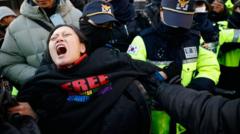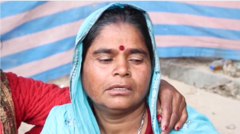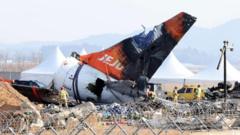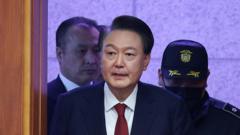As authorities grapple with unprecedented political turmoil, questions linger over the implications for governance and accountability.
**Challenges in Arresting South Korea's Impeached Leader: A Political Standoff**

**Challenges in Arresting South Korea's Impeached Leader: A Political Standoff**
The complex circumstances surrounding the failed arrest of South Korea's suspended president Yoon Suk Yeol highlight the deep political divides within the country.
In a remarkable turn of events, South Korean police found themselves unable to arrest impeached President Yoon Suk Yeol after a prolonged six-hour standoff outside his private residence in Seoul. Despite being armed with a warrant and backed by over a hundred officers, law enforcement was met with resistance from Yoon's security detail, who formed a human barricade and used vehicles to obstruct the police's efforts. This confrontation epitomizes the unprecedented and chaotic nature of the past month in South Korean politics.
Yoon, who previously declared martial law, has now been impeached and awaits a critical decision from the constitutional court regarding his removal from office. A significant number of supporters gathered outside his residence, expressing vocal opposition to his arrest, indicating his continued influence and support base despite growing political controversies.
The situation raises vital questions about why police struggled to effectuate the arrest. Although Yoon has lost his presidential powers due to impeachment, he remains entitled to a security detail provided by the Presidential Security Service (PSS). Experts suggest that security personnel displayed unwavering loyalty to Yoon, operating under either misinterpretations of their constitutional duties or an allegiance that prioritizes Yoon over the institution of the presidency.
Political analysts note a split within the PSS, as acting President Choi Sang-mok has not yet persuaded the security team to comply with official orders. The ties between members of the PSS and Yoon deepen the confusion, as many were appointed during his administration.
The growing polarization in South Korean politics — between supporters of Yoon, who justified his martial law, and his opponents — exacerbates the challenge. Most citizens agree that accountability measures should be taken against Yoon for his controversial decisions, but there is a lack of consensus on what form this accountability should take.
Moreover, tensions escalated outside Yoon's residence, where heated protest speeches led to skirmishes with police. Should authorities choose to reinforce their arrest efforts, risks of confrontation with armed security forces could heighten, potentially leading to dangerous outcomes.
Investigations against Yoon by the Corruption Investigation Office (CIO)—a relatively new body established in response to previous presidential scandals—must conclude before an arrest warrant expiry on January 6. As the weekend approaches, a heightened presence of supporters could pose an additional challenge for law enforcement while they contemplate securing a new arrest warrant.
South Korea finds itself navigating a turbulent political landscape, with the future of Yoon Suk Yeol's leadership shrouded in uncertainty and increasing tension.
Yoon, who previously declared martial law, has now been impeached and awaits a critical decision from the constitutional court regarding his removal from office. A significant number of supporters gathered outside his residence, expressing vocal opposition to his arrest, indicating his continued influence and support base despite growing political controversies.
The situation raises vital questions about why police struggled to effectuate the arrest. Although Yoon has lost his presidential powers due to impeachment, he remains entitled to a security detail provided by the Presidential Security Service (PSS). Experts suggest that security personnel displayed unwavering loyalty to Yoon, operating under either misinterpretations of their constitutional duties or an allegiance that prioritizes Yoon over the institution of the presidency.
Political analysts note a split within the PSS, as acting President Choi Sang-mok has not yet persuaded the security team to comply with official orders. The ties between members of the PSS and Yoon deepen the confusion, as many were appointed during his administration.
The growing polarization in South Korean politics — between supporters of Yoon, who justified his martial law, and his opponents — exacerbates the challenge. Most citizens agree that accountability measures should be taken against Yoon for his controversial decisions, but there is a lack of consensus on what form this accountability should take.
Moreover, tensions escalated outside Yoon's residence, where heated protest speeches led to skirmishes with police. Should authorities choose to reinforce their arrest efforts, risks of confrontation with armed security forces could heighten, potentially leading to dangerous outcomes.
Investigations against Yoon by the Corruption Investigation Office (CIO)—a relatively new body established in response to previous presidential scandals—must conclude before an arrest warrant expiry on January 6. As the weekend approaches, a heightened presence of supporters could pose an additional challenge for law enforcement while they contemplate securing a new arrest warrant.
South Korea finds itself navigating a turbulent political landscape, with the future of Yoon Suk Yeol's leadership shrouded in uncertainty and increasing tension.



















